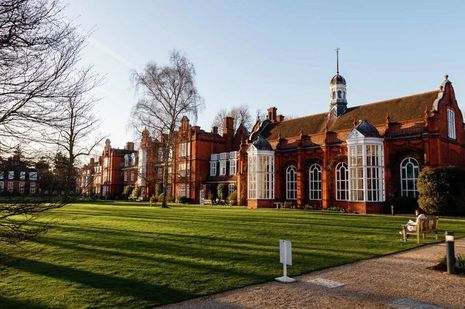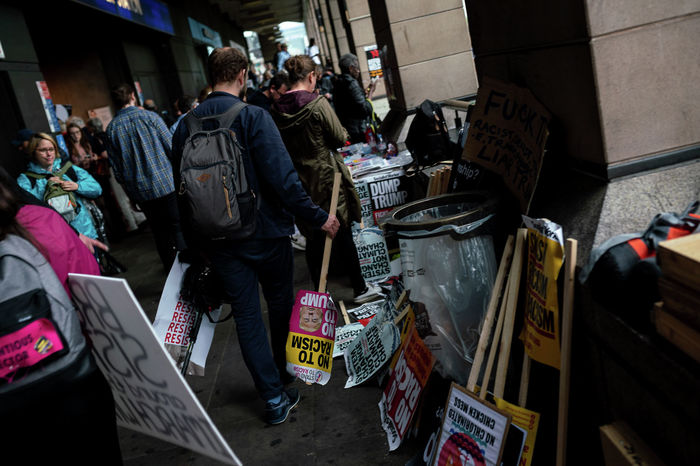DfE counter-terror unit contacted Cambridge over PalSoc speaker concerns
A Palestinian journalist, who described the October 7 attacks as a ‘great day’, was due to speak at Newnham in October before the event’s cancellation

The Department for Education’s (DfE) counter-terror team contacted the University of Cambridge to “raise concerns” about a student event featuring a Palestinian journalist who called the October 7 attacks a “great day,” documents obtained by Varsity show.
The event, which was organised by the Cambridge University Palestine Solidarity Society (PalSoc), was due to host Palestinian journalist Abubaker Abed at Newnham College to speak about “journalism, Gaza, and the role of action in shaping narratives”.
However, after it emerged that Abed had posted tweets celebrating proscribed terror group Hamas’s attacks on October 7th, 2023, PalSoc cancelled the event.
Now, internal documents seen by Varsity reveal that the DfE flagged the event under their counter-terror protocols, and contacted the University to “raise concerns”.
Varsity understands that the event organisers were not contacted by government officials prior to its cancellation.
At the University’s Prevent Committee meeting, where the DfE’s communications were discussed, unnamed attendees expressed concerns about the potential for officials to intervene in “lawful free speech” on campus.
The committee is charged with ensuring that the University meets its “obligations” to the Prevent counter-terrorism scheme and the Higher Education Freedom of Speech Act.
Members of the committee also pointed to previous allegations from Prevent officials “that the higher education sector was under-referring individuals to Prevent,” though these concerns had since been quelled.
Prior to the meeting, Abed, who left Gaza in April 2024 and now lives in Britain, referred to members of Hamas, a proscribed organisation in Britain, as part of the “resistance” or as “resistance fighters” and called the October 7th massacre a “great day” on X – formerly Twitter.
“O God, be pleased with our resistors and martyrs and loved ones, and be pleased with those who raised our heads and restored our dignity on that great day,” he wrote in Arabic. “O God, have mercy on our people and their heroic families, and compensate them for their sacrifices.”
The Times raised the tweets with the Society, whose spokesperson stated that following “a conversation with university staff involved in procuring and booking this event, and in line with their due diligence policies regarding speaker events, the event is cancelled as it stands”.
Abed told The Times that “decontextualising” his statements should be avoided. He said: “The tweet you refer to was a prayer, not a ‘celebration’ of violence. It expressed mourning and solidarity with Palestinians.
“At no point have I celebrated the killing of civilians or condoned attacks on non-combatants … My reference to ‘resistance’ reflects the internationally recognised right of an occupied people to resist military occupation, as affirmed under international law and not support for any particular armed group or act of violence.”
The DfE’s intervention has been slammed by a senior academic who sits on University Council telling Varsity: “The presence of the Prevent programme is inherently antithetical to freedom of speech in Universities. As an academic, the idea that a government programme could be observing my work makes the very principle of free thought near-impossible.
“The University’s willingness to bend over backwards for so-called ‘counter-terror’ initiatives, while refusing to discipline a scientific racist, demonstrates how their free speech initiatives are little more than an attempt to pander to dominant anti-intellectual ideology”.
Varsity understands that, prior to the cancellation of the event, the University and Newnham had been exploring “potential mitigations” to ensure the event could go ahead within the bounds of lawful free speech.
The Prevent Committee noted that “imposing mitigation measures on any proposed event was very rare, as was the DfE’s intervention in this instance, and that permission for events to proceed was almost never withheld.”
Cambridge’s Prevent committee made eight investigations in the previous academic year, the most in recent times – with activists from Cambridge for Palestine claiming that the rise was linked to increased pro-Palestine activism.
The Prevent scheme as a whole has previously come under fire from student campaigners, who claimed the programme was used to “restrict” pro-Palestine protesters last year.
Students from Cambridge University Amnesty society published a motion that the Prevent program, as a whole, “violates some of our most fundamental human rights and espouses racist, Islamophobic and disablist rhetoric”.
The campaigners, speaking at an SU council meeting, claimed that colleges have used the scheme to cancel and police student events. They also said that Prevent enables colleges to be “aggressive” towards political societies.
The proposers of the motion quoted an Amnesty International report which claims that people “have been referred to Prevent for expressing non-violent beliefs”.
These findings also follow the University’s free speech policy coming under significant scrutiny in recent months, after they made the controversial decision not to discipline “race realist” fellow Nathan Cofnas.
Cofnas sparked controversy after he argued for the “preservation of racial distinctions” and claimed that the number of black Harvard academics “would approach zero” in a true meritocracy in a 2024 blog post.
The University launched an investigation into Cofnas’ comments after 58 students reported them for racial discrimination. But, following a year-long process, the University stated that Cofnas’ comments represented lawful free speech, triggering outcry from the student body.
In a recent interview with Varsity, Lord Smith, the new chancellor, said his “number one priority” is the defence of free speech and academic freedom. Describing free expression as “the bottom line,” he urged colleagues against “kowtowing to anyone […] trying to determine what a professor can or can’t research”.
Cambridge’s free speech policy has also undergone significant changes in recent years, as a consequence of the Higher Education Freedom of Speech Act introduced last year.
The University originally revised its freedom of speech policy to reflect the provisions of the draft act, proposed by the outgoing Conservative government. This included provisions to allow academics to express “controversial or unpopular opinions within the law, without fear of intolerance or discrimination”.
When the new Labour government took power, Education Secretary Bridget Phillipson chose to suspend the bill – but Cambridge still decided to enact the policy in its previous form.
The University of Cambridge has been contacted for comment.
 News / Cambridge academics sign open letter criticising research funding changes22 February 2026
News / Cambridge academics sign open letter criticising research funding changes22 February 2026 News / Supporters protest potential vet school closure22 February 2026
News / Supporters protest potential vet school closure22 February 2026 News / University Council rescinds University Centre membership20 February 2026
News / University Council rescinds University Centre membership20 February 2026 News / Hundreds of Cambridge academics demand vote on fate of vet course20 February 2026
News / Hundreds of Cambridge academics demand vote on fate of vet course20 February 2026 Comment / A tongue-in-cheek petition for gowned exams at Cambridge 21 February 2026
Comment / A tongue-in-cheek petition for gowned exams at Cambridge 21 February 2026









